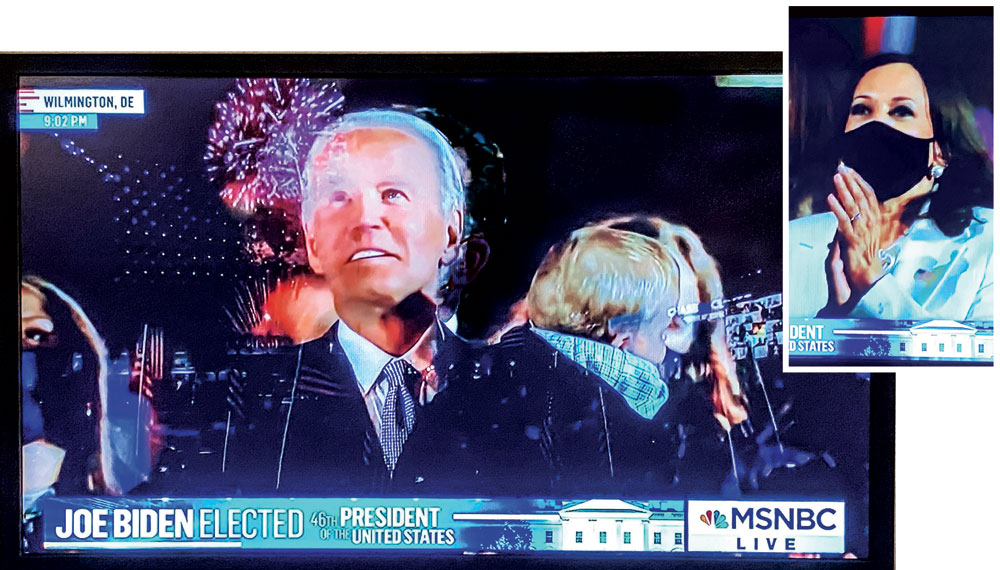
Four days after election day, the Pennsylvania vote count was completed and President-elect Joe Biden and Vice President-elect Kamala Harris held an evening car rally with celebratory fireworks.
One clear conclusion from the 2020 Presidential election is that the American electorate seems more divided than it has been since the Civil War. “One Small Step” is an initiative that tries to bridge that divide. Formed two years ago as an outgrowth of StoryCorps, which records and shares conversations with Americans from all walks of life, “One Small Step” brings together people with different political views to break down boundaries created by politics. The goal is to remind people they have more in common with each other than they may think.
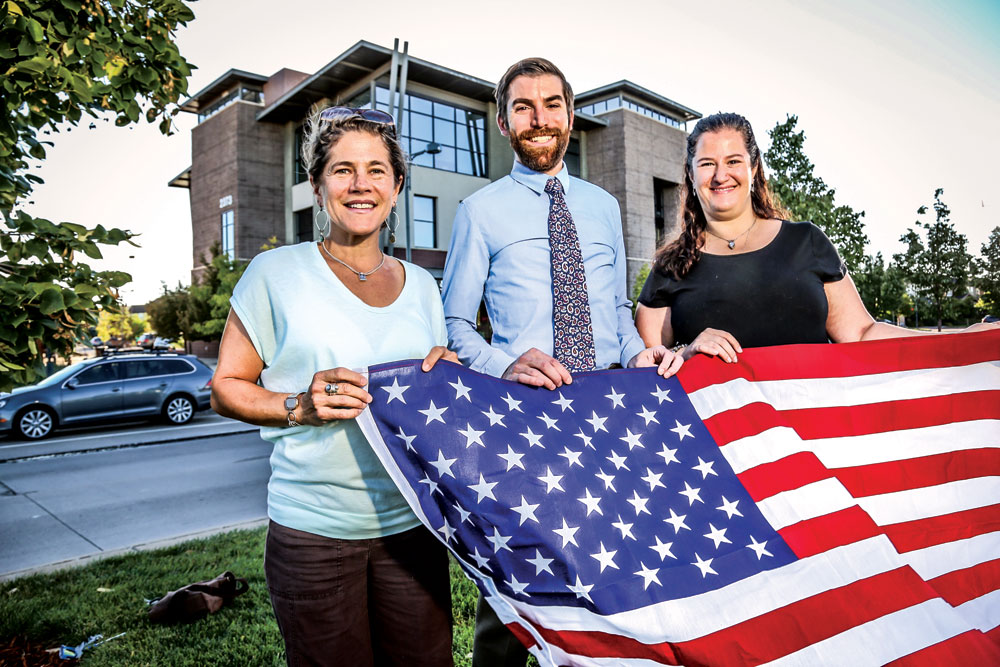
In 2018, East Denver residents Alix Shaer, Andrew Peters, and Jen Anderson participated in a StoryCorps project bringing together people of differing political persuasions. The goal of the facilitated, two-person discussions was to gain a better understanding of the other person’s views.
Northeast Denver residents who participated in the “One Small Step” project shared their experiences in our October 2018 article, “We’re All Americans–Finding Common Ground” (https://frontporchne.com/article/americans-finding-common-ground/) This month we asked those same participants if they had continued their efforts to reach across the divide in the ensuing years.
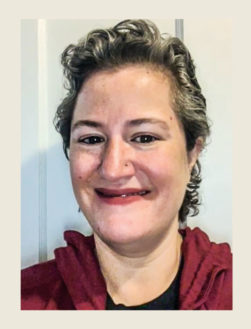
Jen Anderson, who lives in the East Colfax neighborhood, says she has made a conscious effort to keep up friendships with people who have political beliefs that are very different than hers. “It’s important that we don’t just stay in our separate silos thinking ‘we’re good and they are bad.’” She worries that with the increased popularity of Parler, a right-wing alternative to Twitter and Facebook, that Americans will become even more polarized. “It’s easy to get upset on social media and get into a spiral. I think we all need to find ways to connect more in person. It’s much less toxic.” Anderson, who has battled cancer over the past year, says she received an outpouring of help from both her liberal and conservative friends. “Having those kinds of connections can help you move beyond political divisions.”
Jen Anderson urges making connections beyond politics. “I can 100% support my neighbor even if I can’t support the man that he supports politically.”
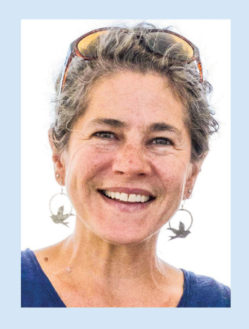 That’s exactly what Central Park resident Alix Shaer believes. “We’re all human beings, and we all have the same emotions, regardless of what politics we have.” That’s one reason she has been mystified that the pandemic has become a divisive issue. “We’re all in this together, so you would think that we would rally and unite, but instead it has devolved into conflicts between pro-maskers and anti-maskers.” A self-described liberal Democrat, she believes President-elect Joe Biden when he says he wants to unify the country. She says the current occupant of the White House never wanted that. “President Trump’s messaging was divisive and vitriolic from the start, and I think that caused people on both sides to be angrier and more amped up.
That’s exactly what Central Park resident Alix Shaer believes. “We’re all human beings, and we all have the same emotions, regardless of what politics we have.” That’s one reason she has been mystified that the pandemic has become a divisive issue. “We’re all in this together, so you would think that we would rally and unite, but instead it has devolved into conflicts between pro-maskers and anti-maskers.” A self-described liberal Democrat, she believes President-elect Joe Biden when he says he wants to unify the country. She says the current occupant of the White House never wanted that. “President Trump’s messaging was divisive and vitriolic from the start, and I think that caused people on both sides to be angrier and more amped up.
“I wish as a country we could all try to have the kinds of conversations that ‘One Small Step’ is encouraging,” says Alix Shaer.
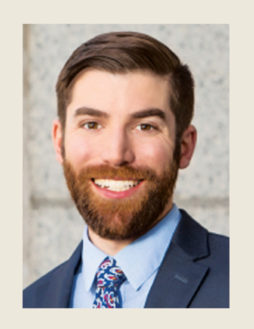 Libertarian Andrew Peters agrees that President Trump has been a polarizing figure, but he also thinks the country is grappling with its own identity, especially because of demographic changes. “I think a lot of people think they have lost things lately—lost authority or lost status — so they fight against that.” Another thing that causes the division, according to Peters, a North Park Hill resident, is that Americans look to the federal government for moral authority, so all rhetoric becomes super-charged. “Both liberals and conservatives are asking the government to answer moral questions and that plays into the good-versus-evil conflicts which create such division.” He thinks the best way to lower the political temperature is to put more emphasis on state and local issues. “Those don’t line up as polarizing culture war the way national politics do. I think there are a lot of local issues where conservatives and liberals could find themselves on the same side.”
Libertarian Andrew Peters agrees that President Trump has been a polarizing figure, but he also thinks the country is grappling with its own identity, especially because of demographic changes. “I think a lot of people think they have lost things lately—lost authority or lost status — so they fight against that.” Another thing that causes the division, according to Peters, a North Park Hill resident, is that Americans look to the federal government for moral authority, so all rhetoric becomes super-charged. “Both liberals and conservatives are asking the government to answer moral questions and that plays into the good-versus-evil conflicts which create such division.” He thinks the best way to lower the political temperature is to put more emphasis on state and local issues. “Those don’t line up as polarizing culture war the way national politics do. I think there are a lot of local issues where conservatives and liberals could find themselves on the same side.”
“If we could focus more on state and local issues, that might lower the political temperature a lot,” says Andrew Peters.
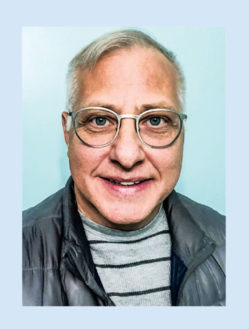 John Laukkanen is a social worker who lives in the East Colfax neighborhood. As a conservative, he says he is in the minority at most places he has worked, but he doesn’t try to engage his liberal colleagues in political dialogue. “I try to avoid political conversations altogether. They’re just not helpful,” he says. He did enjoy his “One Small Step” conversation in 2018 but says that conversation concentrated on life experiences, not politics. Laukkanen wishes that people didn’t get so wrapped up with emotion when they talk politics, and he is nostalgic for the kinds of conversations he had in college several decades ago. “We could have impassioned debates, but there wasn’t this moral virtue to the debates. Now it’s a zero sum game where I’m evil if I don’t agree with you.”
John Laukkanen is a social worker who lives in the East Colfax neighborhood. As a conservative, he says he is in the minority at most places he has worked, but he doesn’t try to engage his liberal colleagues in political dialogue. “I try to avoid political conversations altogether. They’re just not helpful,” he says. He did enjoy his “One Small Step” conversation in 2018 but says that conversation concentrated on life experiences, not politics. Laukkanen wishes that people didn’t get so wrapped up with emotion when they talk politics, and he is nostalgic for the kinds of conversations he had in college several decades ago. “We could have impassioned debates, but there wasn’t this moral virtue to the debates. Now it’s a zero sum game where I’m evil if I don’t agree with you.”
“Until we get away from emotional arguments and instead look at outcomes, the divisions aren’t going away,” says John Laukkanen.
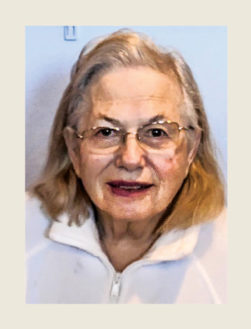 As a Democrat, Judy Lazar also finds it difficult to discuss politics with people on the opposite side of the political spectrum. Lazar, who lives in Green Valley Ranch, says she has been especially unsuccessful talking with Trump supporters. “It’s hard for me to understand how they can so blindly follow him.” She says she’s very pessimistic about the future, even under a Biden administration. She is especially worried for her seven grandchildren. “I’ve never seen so much hatred in this country. I feel like it’s civil war time, and I don’t think things are going to get better any time soon.”
As a Democrat, Judy Lazar also finds it difficult to discuss politics with people on the opposite side of the political spectrum. Lazar, who lives in Green Valley Ranch, says she has been especially unsuccessful talking with Trump supporters. “It’s hard for me to understand how they can so blindly follow him.” She says she’s very pessimistic about the future, even under a Biden administration. She is especially worried for her seven grandchildren. “I’ve never seen so much hatred in this country. I feel like it’s civil war time, and I don’t think things are going to get better any time soon.”
“I’m very worried. I don’t see how we’re going to be able to bridge the political divide in this country,” says Judy Lazar.
![]()
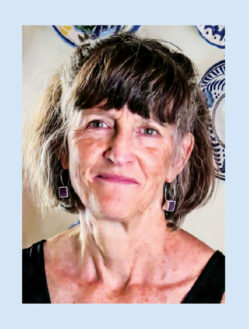 Ellen Miller-Brown still holds out hope for civil discourse. She is always eager to talk to people with differing perspectives about what their aspirations are for the nation. Her advice for a successful conversation? “It’s important to really listen to them and not be preoccupied about what your comeback is going to be. I’ll be 70 next year, and I don’t worry about being right anymore. I worry about learning and finding out what makes other people tick.” Miller-Brown, who lives in Central Park, thinks the only way to overcome the political divide is for more people to practice real empathy. “A lot of people feel they have been left behind, and we can’t dismiss those feelings. We need to try to see the world from their viewpoint.”
Ellen Miller-Brown still holds out hope for civil discourse. She is always eager to talk to people with differing perspectives about what their aspirations are for the nation. Her advice for a successful conversation? “It’s important to really listen to them and not be preoccupied about what your comeback is going to be. I’ll be 70 next year, and I don’t worry about being right anymore. I worry about learning and finding out what makes other people tick.” Miller-Brown, who lives in Central Park, thinks the only way to overcome the political divide is for more people to practice real empathy. “A lot of people feel they have been left behind, and we can’t dismiss those feelings. We need to try to see the world from their viewpoint.”
“If people are willing to listen and learn from others, we can be the country we aspire to be,” says Ellen Miller-Brown.
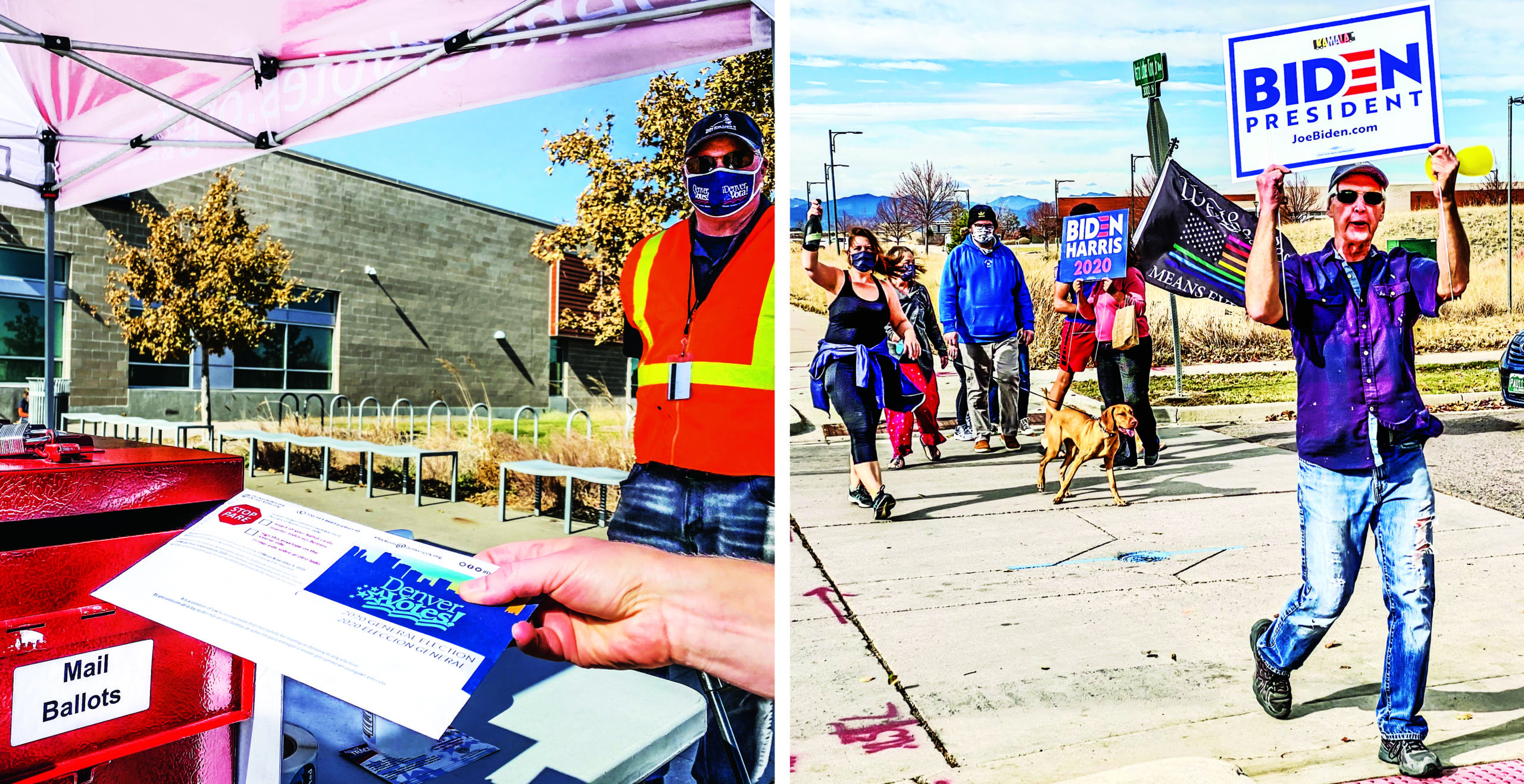
Left: Colorado was recognized nationally for our mail-in ballots and numerous ballot drop boxes. Right: Moments after Biden’s win was announced, a spontaneous mini-parade showed up on Martin Luther King Blvd.




0 Comments